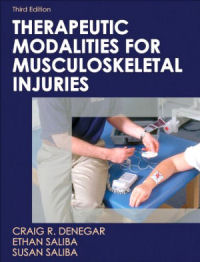Chiropractic and Health Books
Therapeutic Modalities for Musculoskeletal Injuries
 Therapeutic Modalities for Musculoskeletal Injuries
Therapeutic Modalities for Musculoskeletal Injuries
Check New and Used Prices
Therapeutic Modalities for Musculoskeletal Injuries, Third Edition, provides comprehensive coverage of evidence-based therapies for athletic injury rehabilitation. Part of Human Kinetics' Athletic Training Education Series, the updated third edition presents the most current research regarding therapeutic modalities for athletic injuries and improves on previous editions through the alignment of the text's content with the National Athletic Trainers' Association (NATA) Athletic Training Educational Competencies. The result is a valuable resource for students preparing for NATA certification.
Therapeutic Modalities for Musculoskeletal Injuries, Third Edition, assists students and professionals in understanding the theoretical basis for and safe use of each modality. Readers will also find the text helpful in their research of the clinical literature to determine the effectiveness of each modality. In addition to explaining how to apply each therapy, this text addresses why and when each modality would prove safe and effective, providing readers with information for improved decision making regarding the utility of each modality in the injury management continuum.
Therapeutic Modalities for Musculoskeletal Injuries offers balanced coverage of the uses and abuses of modality treatments, allowing readers to evaluate and apply the most effective modalities for specific injuries. The third edition begins with a discussion of the physical and psychological aspects of injury and rehabilitiation, persistent and chronic pain and pain relief, and the impact of injury and pain on neuromuscular control. Following that is a presentation of evidence-based application of therapeutic modalities, including cryotherapy and superficial heat, electrotherapy, ultrasound, diathermy, electromagnetic fields, low-level laser therapy, and manual therapies. Suggested treatment plans for acute musculoskeletal injuries, clinical applications for neuromuscular control and biofeedback, and clinical management of persistent pain conclude the text.
Though specific treatment for individual problems is not prescribed, reference is made to specific guidelines, summary articles, and research articles for further study. In this way, the text encourages students and professionals to seek additional research in order to construct optimal treatment strategies and to support the clinical decisions they make.
Therapeutic Modalities for Musculoskeletal Injuries, Third Edition, offers a variety of learning aids to help students understand, apply, and review the content, including chapter objectives, practical scenarios, key points, key terms, sidebars, review questions, and references. To reinforce practical scenarios, summary boxes throughout the text provide at-a-glance highlights of how treatments are used. Instructors will find time-saving supplemental materials, including a fully updated instructor guide, test bank, and image bank.
Human Kinetics' Athletic Training Education Series contains six textbooks, each with its own supporting instructional resources. Featuring the work of respected athletic training authorities, the series parallels and expounds on the content areas established by the NATA Education Council.
Therapeutic Modalities for Musculoskeletal Injuries
Check New and Used Prices